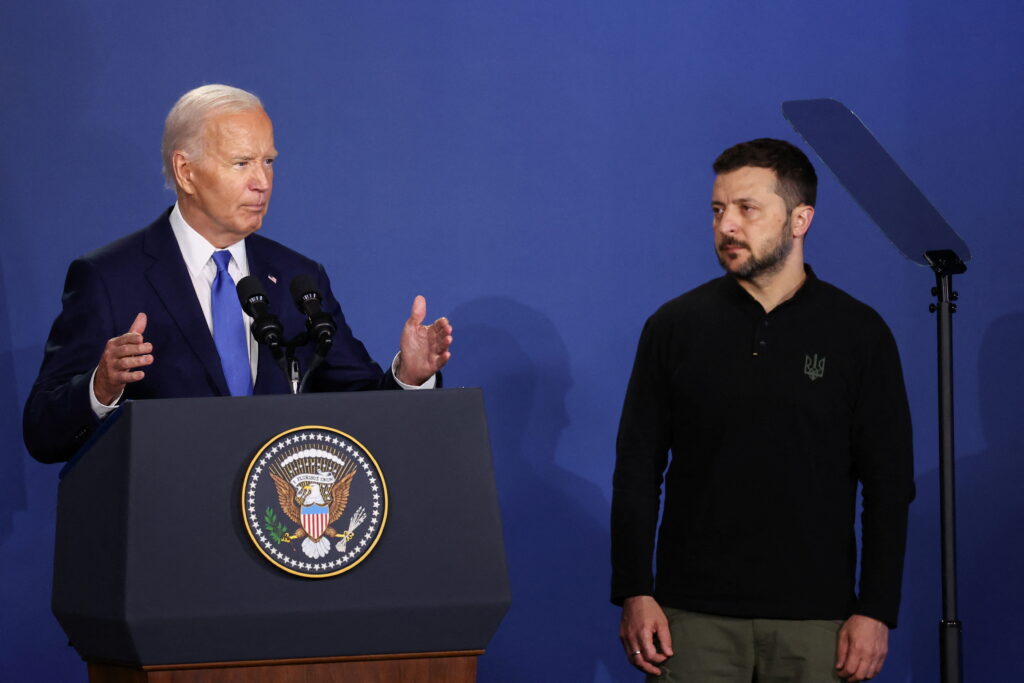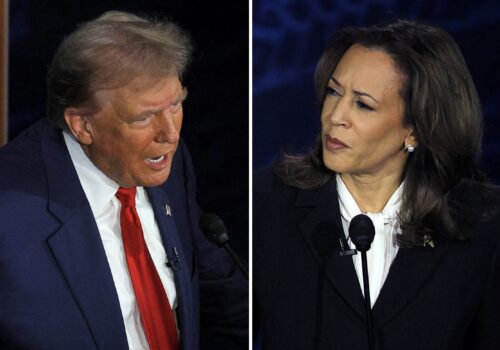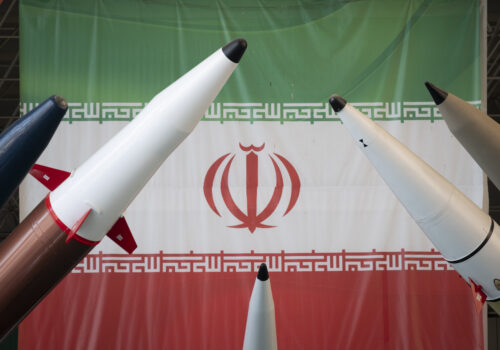Paraphrasing the musical Hamilton, in July US President Joe Biden decided to “throw away his shot” at a second presidential term. More troubling now, in the final four months of his presidency, he also is in danger of throwing away his shot at a lasting, positive foreign policy legacy because of excessive caution regarding Ukraine.
What’s most disappointing about this is that Biden has done more than any other global leader to define the challenges we face from an increasingly tight tryst of tyrannical regimes—China, Russia, North Korea, and Iran. He also deserves enormous credit for the consistency and scale of US and allied support for Ukraine since Russian leader Vladimir Putin’s February 2022 full-scale invasion, without which Kyiv might already be lost.
That said, think about Biden as you would assess the doctor who has accurately diagnosed your disease, but who is fearful of the side effects if he applies the full treatment necessary to cure it. In this case, the greatest of those side effects is Russian escalation. Ironically, it is precisely Biden’s caution that has encouraged continued Russian, Chinese, North Korean, and Iranian misbehavior. The US and allied response to the increased cooperation among these countries continues to fall short of actions that would frustrate their common cause.
Last week, during meetings with UK Prime Minister Keir Starmer, Biden balked again at giving Ukraine the green light to use long-range weapons—such as the British-French Storm Shadow or US Army Tactical Missile System (ATACMS)—to hit targets deep inside Russia for fear of escalating the fight. Yet failing to remove these restrictions severely limits Ukraine’s capability to hit the source of Russia’s mounting attacks, which are destroying its infrastructure, killing its civilians, and severely limiting its ability to prevail.
“There cannot be long-range restrictions in Ukraine when terrorists do not have such restrictions,” Ukrainian President Volodymyr Zelenskyy recently said on Telegram. “America, Britain, France, other partners have the power to help us stop terror.”
History will remember Biden for accurately defining our era as an “inflection point” in an unfolding struggle between democracy and a small handful of autocratic tyrants, something he began to do even during the 2020 presidential campaign prior to taking office.
Speaking from the Resolute Desk in the Oval Office on October 19, 2023, he went even further and powerfully connected the dots between ongoing wars in Europe and the Middle East. Said Biden: “We’re facing an inflection point in history, one of those moments where the decisions we make today are going to determine the future for decades to come.”
He also was clear about what connected the two distant battlegrounds. “Hamas and Putin represent different threats, but they share this in common,” he said. “They both want to completely annihilate a neighboring democracy—completely annihilate it.” He could just as well have named Iran alongside Hamas in that quote, as that’s where the fundamental regional danger rests, with its global connections.
What’s evolved during the Biden presidency—and has escalated since Putin’s invasion of Ukraine in February 2022 and Hamas’s terrorist attack on Israel in October 2023—has been an unprecedented geopolitical and defense-industrial cooperation among China, Russia, Iran, and North Korea.
Whether Vice President Kamala Harris or former President Donald Trump is elected in November, the next US president will have to address this gathering challenge.
“The coalescing partnership of autocracies led by China and Russia will impose strategic choices on Western democracies, no matter who wins the US presidential election,” wrote Yaroslav Trofimov in the Wall Street Journal recently. “Can the US and allies deter all these rivals—including Iran and North Korea—at the same time, given the decay in the West’s military industrial base and the unwillingness of voters to spend more dramatically on defense? And if not, should, and could, an accommodation be sought with one of the rival great powers? If so, which one—and at what cost?”
Underscoring the rising dangers posed by this fast-evolving autocratic partnership, Secretary of State Antony Blinken last week revealed that Iran has sent Russia short-range ballistic missiles, which will threaten Ukraine alongside Iranian drones and North Korean ballistic missiles. Hours later, the United States, the United Kingdom, France, and Germany announced new sanctions on people and entities with ties to the Iranian missile supply, along with Iran Air, the Islamic Republic’s commercial airline.
Said Blinken: “We’ve warned Tehran publicly, we’ve warned Tehran privately, that taking this step would be a dangerous escalation.”
Central Intelligence Agency Director William J. Burns and Chief of the UK Secret Intelligence Service Richard Moore wrote an op-ed in the Financial Times that laid out the stakes of our times, in an unprecedented public statement by the two intelligence service chiefs.
“There is no question,” they wrote, “that the international world order—the balanced system that has led to relative peace and stability and delivered rising living standards, opportunities and prosperity—is under threat in a way we haven’t seen since the cold war.”
The historian and diplomat Philip Zelikow, writing in the Texas National Security Review, put it this way: “The United States faces a purposeful set of powerful adversaries in a rapidly changing and militarized period of history, short of all-out war.”
He notes that this is the third time the United States has confronted such a situation.
“The first was between 1937 and 1941 and was resolved by American entry into World War II,” he writes. “The second was between 1948 and 1962, implicating the Soviet Union and the People’s Republic of China,” and that ended with the Cuban Missile Crisis in late 1962, after which the Soviet Union “relaxed its stance in the central confrontation in Europe.”
Put simply, such eras don’t resolve themselves.
“During the next two or three years,” Zelikow writes, “the situation will probably settle more durably in one direction or another: wider war or uneasy peace.” He gives the possibility of “worldwide warfare only in the 20-30 percent range.” That’s not a reassuring calculus.
A newly elected Harris or a re-elected Trump will inherit that risk. Biden may be older and less scrappy than was Alexander Hamilton in the musical, but he still has a shot at the history books and at making his successor’s job easier if he uses his next four months to strengthen Ukraine at the front line of this global contest.
Frederick Kempe is president and chief executive officer of the Atlantic Council. You can follow him on X: @FredKempe.
This edition is part of Frederick Kempe’s Inflection Points newsletter, a column of dispatches from a world in transition. To receive this newsletter throughout the week, sign up here.
Further reading
Wed, Sep 11, 2024
Experts react: What the presidential debate revealed about how Trump and Harris would conduct foreign policy
New Atlanticist By
On Tuesday night in Philadelphia, the two candidates often presented sharply contrasting visions on a range of foreign policy issues, from tariffs to energy and immigration, and from China to the Middle East.
Fri, Aug 30, 2024
Dispatch from Kyiv: How Ukraine’s incursion into Russia has changed the war
New Atlanticist By John E. Herbst
On an Atlantic Council trip to Kyiv, Ambassador John E. Herbst takes stock of how Ukrainians view the war now that their forces have seized more than 460 square miles of Russian territory.
Tue, Sep 10, 2024
What does Iran get for sending ballistic missiles to Russia?
New Atlanticist By Mark N. Katz
On Tuesday, US Secretary of State Antony Blinken revealed that Tehran has delivered shipments of ballistic missiles to Moscow, raising new concerns about the depth of the Iran-Russia relationship.
Image: Ukraine's President Volodymyr Zelenskiy listens to US President Joe Biden speak at a Ukraine Compact meeting, on the sidelines of the NATO's 75th anniversary summit in Washington, U.S. July 11, 2024. REUTERS/Yves Herman.



